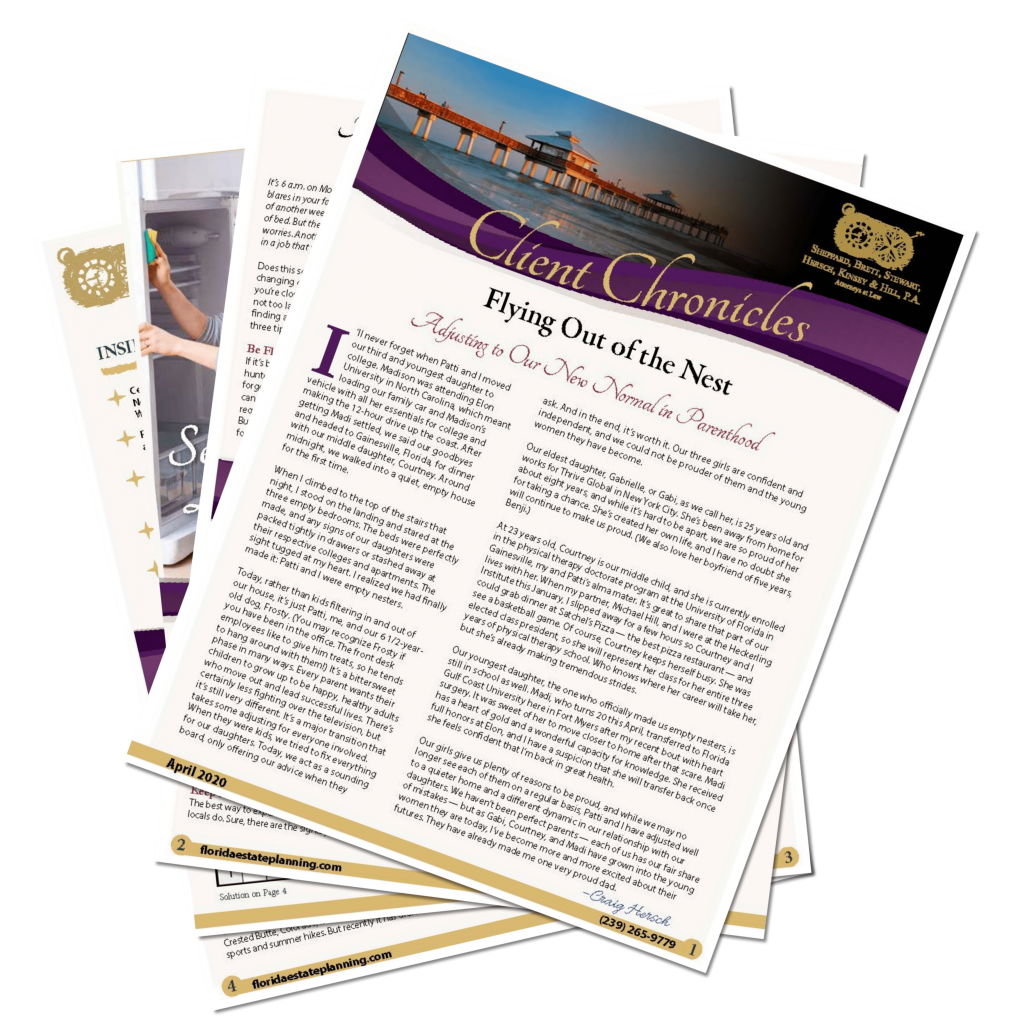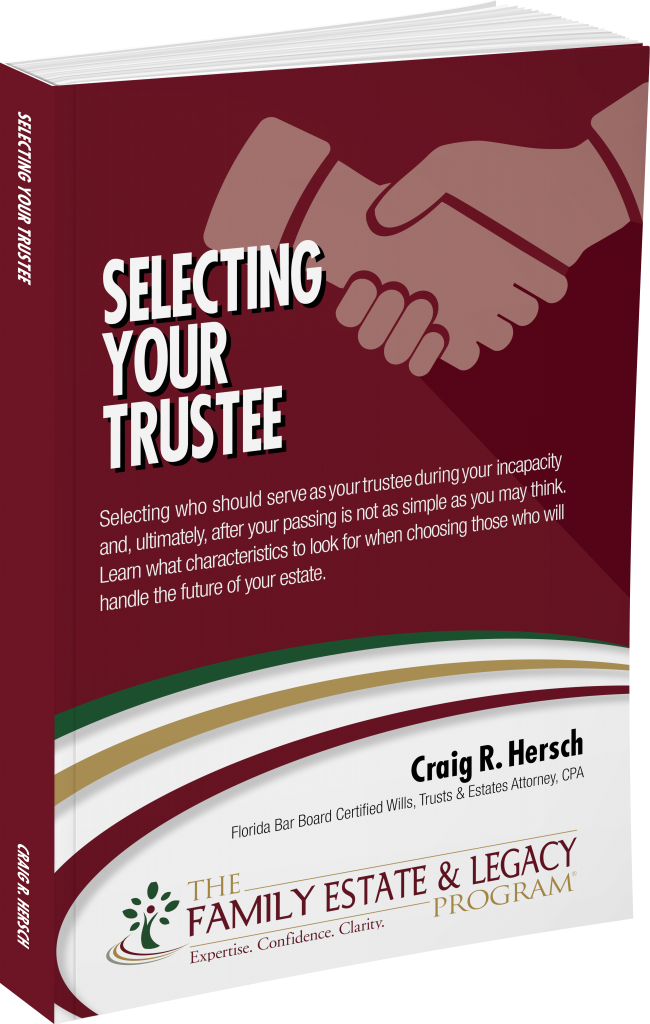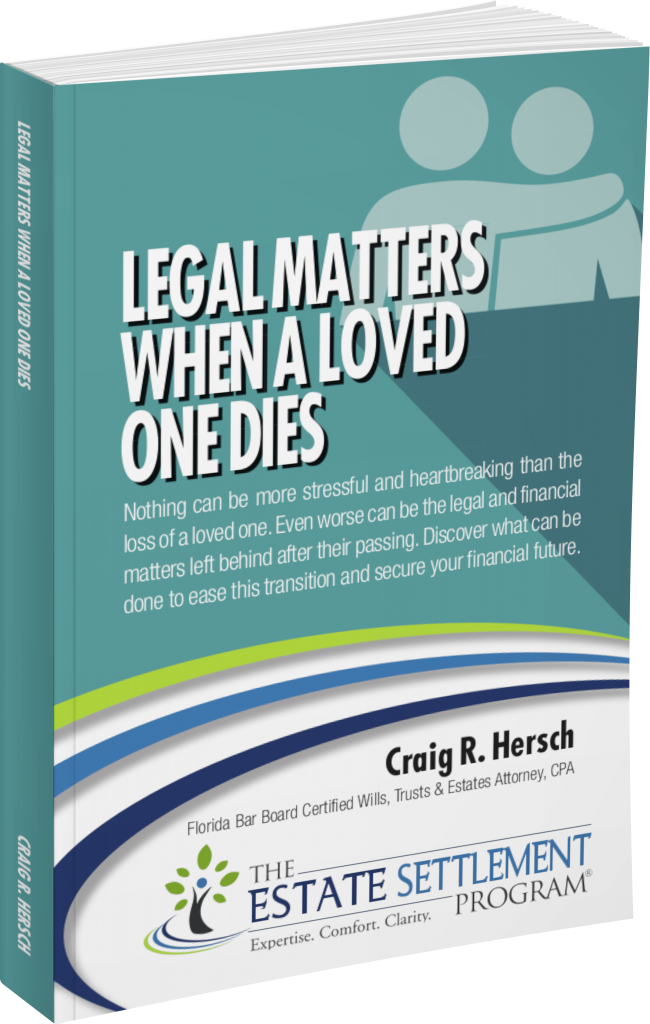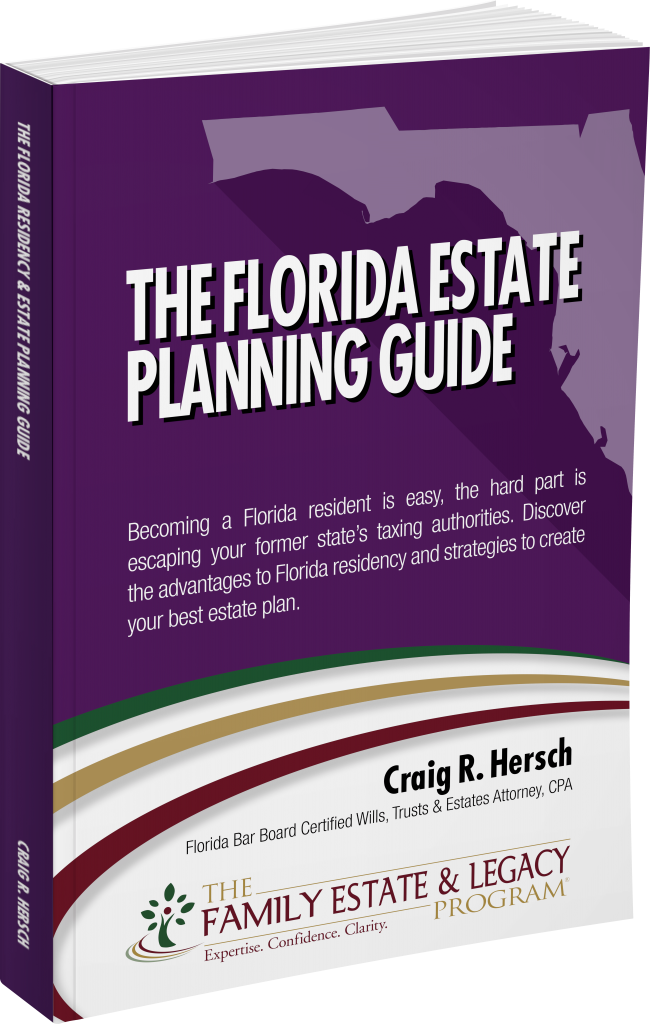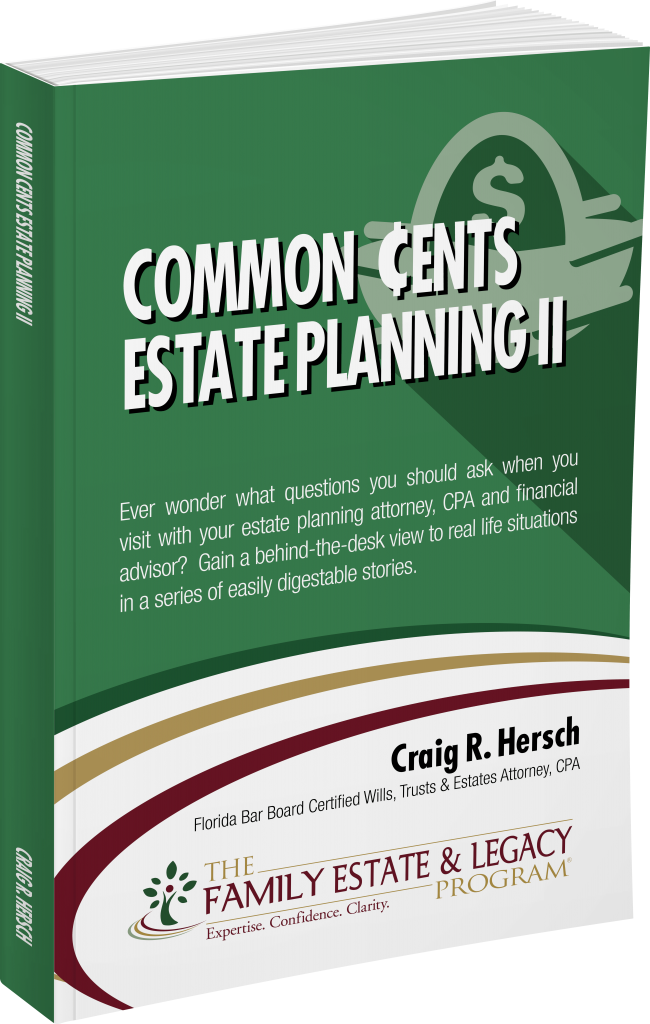Is Your Plan Up-to-Date?
We always ask new clients to bring a copy of their existing estate planning documents to our initial meeting. Then we literally blow the dust off before reading them after ten, fifteen or even twenty years in a safe deposit box.
“So, do you still want your sister Marie to act as a legal guardian for your children should you both die?” I playfully ask the grey-haired septuagenarians sitting across the conference table from me.
“Our youngest son is 43 years old,” the wife says, blushing slightly.
With that revelation, we all have a good chuckle. Nevertheless, there are serious reasons to make sure your estate plan remains up to date.
Florida Trust Code
Not very long ago, the Florida Legislature overhauled the Florida trust code and continues to make changes almost annually. Court cases interpreting the statutes also modify the trust and estate laws. Since Florida is home to a large, wealthy, retiree population, our courts hear a variety of cases that may not commonly occur in other states. Florida’s laws are therefore cutting edge.
Failure to keep up with those laws may cause unintended consequence for your estate plan. The descent and devise of your homestead is a prime example. While these laws date back to the nineteenth century, they are new and unknown to many Florida residents.
More recent changes to the Florida trust code will merit consideration when updating your plan. An example of this is the trustee’s duty to provide an annual accounting to all trust beneficiaries following the grantor’s death. Suppose, for example, Dad had a trust when he died. The trust contains a marital trust for Mom and then distributes to their two daughters at Mom’s death. Upon Dad’s death, Florida law (like most other state laws) mandates that the trustee must provide annual accountings to Mom and both daughters.
This annual accounting should provide the beginning balance of the trust, income such as interest and dividends earned, capital gains and losses realized, expenses paid, the amount of distributions that Mom took from the trust, the ending balance, and any other significant transactions.
Most of our married clients do not want to provide annual accountings to their children during the surviving spouse’s lifetime. Florida law provides a mechanism to circumvent this requirement, called a “Designated Representative”. So long as your trust meets the statutory requirements, the surviving spouse need not detail her deceased husband’s trust’s affairs to her children for the rest of her life.
Sometimes it’s not the surviving spouse who worries about this annual filing requirement. Occasionally our clients don’t want a child who has addiction problems or another beneficiary who may have unreasonable expectations to receive an annual accounting. Again, the proper use of the Florida laws can help the client circumvent this requirement.
There are other issues addressed in the Florida statutes too numerous to detail here. A thorough review of your goals and concerns will bring out which of the Florida trust laws we will use to meet your objectives.
State Income and Estate Taxes
Even if you have successfully escaped your former state’s taxing authority, if you continue to own real estate in that state, or if you continue to earn income in that state, state level income and estate taxes may be due.
In 2005 the federal tax law changed necessitating an update to your estate plan so that you don’t trigger unnecessary state death or income taxes.
Most estate plans of married couples are drafted in such a way so that even if their estate value is high enough to warrant a federal or state death tax, it isn’t paid until both spouses are deceased.
CONSIDER THIS
Assume, for example, that Bill and Bonnie are married. Their attorney helped Bill and Bonnie divide their assets between their two trusts so that no matter who died first, their estate tax exemptions would be entirely applied. (This is no longer necessary in many cases, as I’ll discuss in the “Portability” section below).
Assume that Bill dies first. Bill’s revocable living trust breaks into two “testamentary” trusts upon his death as indicated in the below diagram. The “Family Trust,” otherwise known as a “Credit Shelter Trust,” is funded with assets up to the amount of his estate tax exemption on the date of his death. Any overage is directed to the “Marital Trust”. Both trusts are held for Bonnie for the rest of her lifetime. Bonnie may also be the trustee of the trust, controlling investment and distribution decisions.
Unlike in other examples, here we use revocable trust as the primary documents, not wills. By dividing his revocable living trust into a Family Trust and a Marital Trust at his death, Bill’s estate uses up his federal estate tax exemption yet pays no tax because the Marital Trust qualifies for the marital deduction. Trusts that qualify for the marital deduction do not pay tax until the surviving spouse dies.
A formula in Bill’s trust accomplishes this division. These same formulas are often found in wills where revocable trusts are not used. But here’s the rub – if the formula only addresses the federal estate tax exemption and is not drafted in such a way as to consider the lower state death tax exemption, then state death tax could be triggered on the first spouse’s death!
This is also true for the formulas found in wills.
Failure to Update Could Cause State Tax Payments
That is exactly what occurred in a file that came to me several years ago. “Bill” and “Bonnie” were New York residents who owned five rental properties in New York State that they rented to third parties. At the time of Bill’s death, his estate planning documents—drafted before this decoupling law took effect—were not updated.
The formula clause in Bill’s trust was based upon the federal exemption, as commonly done. Because New York’s state death tax threshold was lower than the federal exemption, his “Family Trust” was over funded for the New York State death tax, triggering a significant tax payment due on Bill’s death.
Bonnie had no choice other than to sell one of the rental properties to pay the tax. These rental properties provide Bonnie with her retirement income, so the sale of a property to pay a tax was quite devastating to her.
What’s so terrible about this whole mess was that a simple two-sentence addition to the formula clause in Bill’s estate plan could have remedied the problem. No New York state death tax would have been paid at Bill’s death.
Even after the change in the law several years ago, many attorneys still use a formula that could trigger state level death tax. This can be a problem for Florida residents who own real estate in states that impose a state level death tax. Without proper drafting, real estate owned in a state that imposes a death tax will trigger the tax if the value of the real estate exceeds the state’s exemption amount.
This highlights the urgency of updating your estate planning documents with knowledgeable, qualified estate planning attorneys when you either own real estate in a state that imposes a death tax or are a resident of such a state.
Portability
Under the pre-2012 federal estate tax law, if a spouse died without using his estate tax exemption, it was lost forever.
Assume that Peter and Paula jointly owned all their assets with rights of survivorship. When Peter dies, everything he owned is now owned by Paula. Even if Peter’s estate is worth billions, because of the unlimited marital deduction there is no tax on his death. But at Paula’s death, their entire net worth would be taxed in her estate. Peter’s exemption was lost because they jointly owned all their assets with rights of survivorship.
The way to remedy that situation in the pre-2012 law was to divide their assets and implement a “Family Trust” or a “Credit Shelter Trust” (some refer to these as A/B trusts) as I illustrated above in Figure 5.1 of my Bill and Bonnie example.
That all changed in 2012 when “portability” became permanent (or at least as permanent as the federal estate tax law can be). With portability, even if the first decedent spouse didn’t set up a testamentary Family Trust to use his exemption, the unused portion can be transferred to his spouse. This is accomplished when the estate files a Federal Estate Tax Return Form 706 and makes an appropriate election on that return.
So if the federal estate tax exemption is $11.54 million at Peter’s death, and he hadn’t used any of his exemption during his lifetime and jointly held everything with Melania at his death, his entire unused exemption could be transferred to Paula resulting in her having a $23.08 million exemption at her death.
Your plan should be reviewed to ensure that portability is factored in to help you achieve your goals.
Failure to Update Could Result in More Capital Gains Tax
If your estate plan predates portability, or if your attorney didn’t consider the effects of portability on estates less than $11.58 million (or the current exemption amount), it’s possible that your beneficiaries won’t enjoy the maximum capital gains tax savings.
If dividing assets between spouses’ trusts is no longer necessary to achieve estate tax savings, doing so with standard planning (“Family Trust/Credit Shelter Trust”) fails to consider the best way to use the step-up in tax cost basis that our estate assets receive at our passing.
CONSIDER THIS
Allow me to explain: assume that I purchased a share of Company A stock on the New York stock exchange for $1/share. My tax cost basis in those shares of stock is therefore $1/share. Over time, the value of that stock increased to $10/share. If I sold the stock during my lifetime at $10/share, then I would realize a $9/share capital gain ($10 selling price minus $1 tax cost basis) and pay taxes on that gain when I filed my annual income tax return.
If instead I died still owning those shares at $10/share, my estate receives a “step-up” in tax cost basis equal to the fair market value as of the date of my death. If my estate and/or my beneficiaries sell the stock the day after my death for $10/share, then they realize no capital gain and pay no capital gains tax.
Under most estate plans drafted with A/B Trusts, capital gains planning isn’t maximized. This means the surviving spouse, or your other loved ones might pay capital gains taxes on your real estate, stock and mutual fund investments that they otherwise shouldn’t have because the estate plan doesn’t concentrate on minimizing the wrong tax. Many estate plans are drafted in a way to avoid estate tax when the estate tax isn’t even an issue.
There are many other laws you should be aware of that have changed in the last few years. I’ve established very clearly why sticking your estate planning documents in a drawer without keeping them up to date could cause adverse consequences.
KEY TAKEAWAYS
- The trust laws and the tax laws are in a constant state of change
- Keeping up with these laws can have a real economic effect on your loved ones
- There’s no formula that applies across the board – what’s good for one family may be entirely inappropriate for another
- Having a qualified, knowledgeable attorney who keeps up with these changes is paramount to your plan’s success
How Can We Help?
